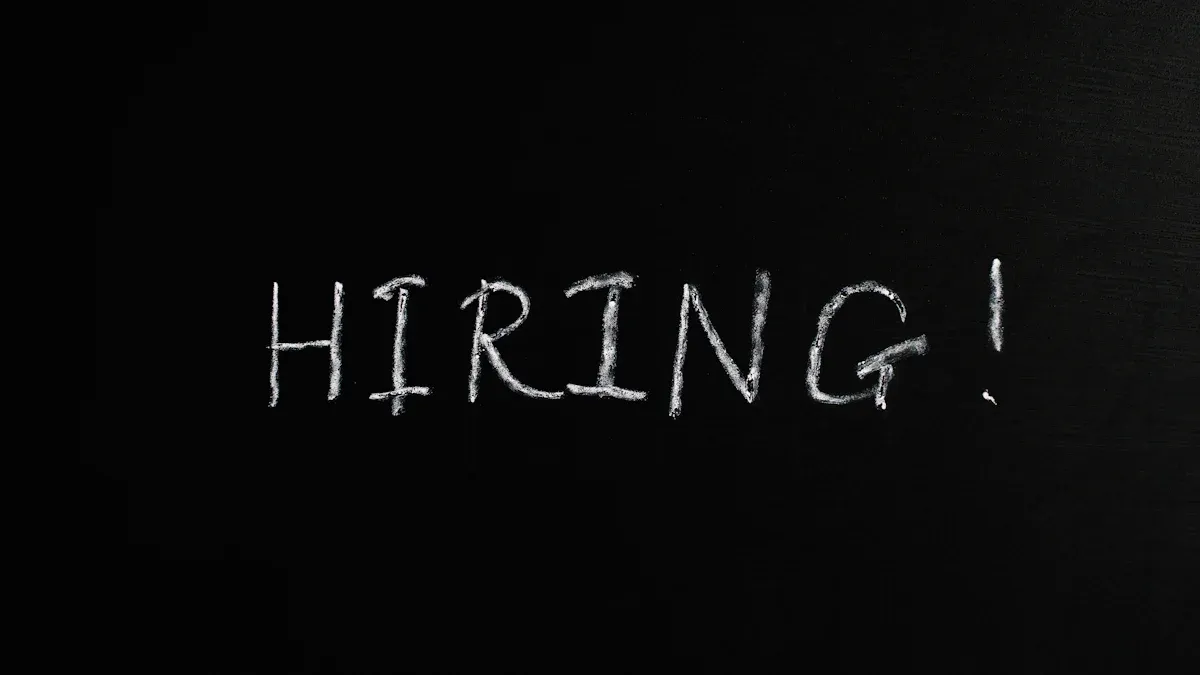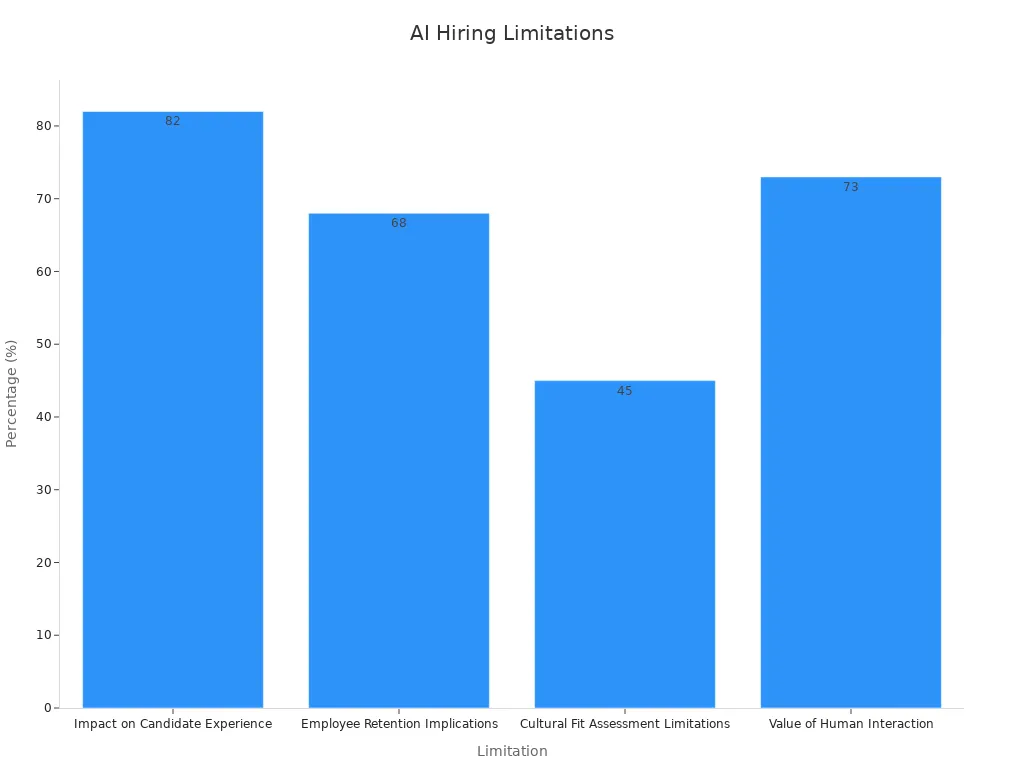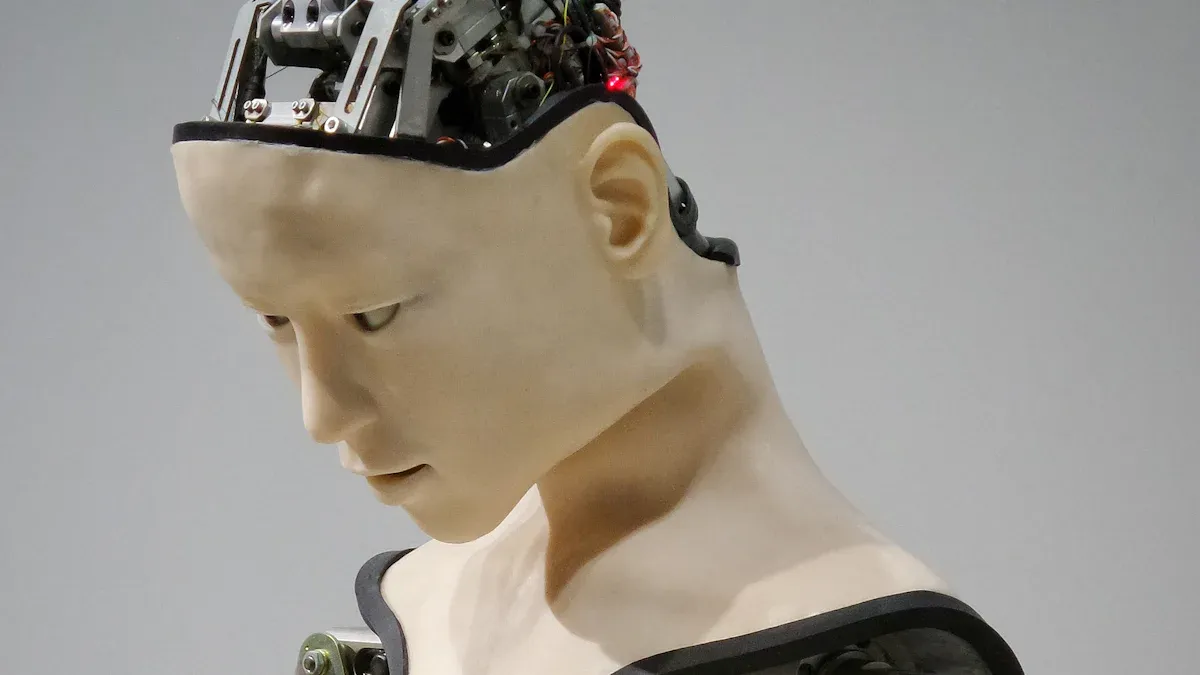AI Versus Human Recruiters in Job Matching Effectiveness

AI-powered job matching has transformed how companies find talent. You might wonder, "AI-Powered Job Matching: Is It Better Than Human Recruiters?" The answer depends on what you value most in the hiring process. AI tools excel in speed and efficiency. For example, they can reduce time-to-hire by up to 70% and cut hiring costs by 30%. Companies like Hilton have seen a 90% improvement in their time-to-fill ratio. However, human recruiters bring intuition and a personal touch, which AI lacks. Understanding these differences helps you decide which approach fits your needs.
Key Takeaways
AI tools make hiring faster, cutting time by 70%.
Human recruiters are great at judging soft skills and culture fit.
Using AI and humans together makes hiring faster and more personal.
AI can study lots of data to find the best candidates.
Mixing AI and humans uses their strengths for better hiring results.
AI-Powered Job Matching: Is It Better Than Human Recruiters?

How AI-Powered Job Matching Works
AI-powered job matching uses advanced algorithms to connect job seekers with the right opportunities. It analyzes resumes, job descriptions, and even historical hiring data to predict which candidates are the best fit for specific roles. This process relies on technologies like machine learning and natural language processing (NLP). For example, NLP helps AI understand the meaning behind words in resumes and job postings, ensuring better matches. A systematic approach, as outlined in research, uses datasets of over 10,000 standardized skills. AI refines recruitment data and identifies connections between disciplines, making the process more accurate and efficient.
Technologies Driving AI Job Matching
Several technological advancements have revolutionized AI-powered job matching. These innovations improve how AI systems source, screen, and match candidates to roles. Key advancements include:
AI algorithms that analyze thousands of applications quickly.
Tools that predict candidate success based on historical data.
Data-driven insights that personalize hiring processes.
Technological Advancement | Impact on AI-Powered Job Matching |
|---|---|
Advanced computer chips | Enhance computational efficiency for AI tasks |
Deep learning technologies | Improve natural language processing and robotics capabilities |
Scalable architectures | Optimize performance for intensive AI workloads |
Integration of AI solutions | Address challenges in various sectors like agriculture and healthcare |
These technologies allow AI to improve accuracy and efficiency in recruitment, making it a powerful tool for job matching.
Examples of AI-Powered Job Matching in Action
Real-world examples highlight how AI-powered job matching delivers measurable results. For instance, JobGet has achieved 150,000 successful placements, with 2 million downloads and $52 million in Series B funding. Similarly, Unilever saw a 16% increase in diversity and a 50% reduction in time to fill vacancies. IBM also reported a 30% boost in recruiter productivity. These outcomes demonstrate how AI-powered job matching transforms recruitment processes, making them faster and more effective.
The Role of Human Recruiters in Job Matching
How Human Recruiters Operate
Human recruiters play a pivotal role in job matching by leveraging their expertise and interpersonal skills. They assess resumes, conduct interviews, and evaluate candidates' qualifications to ensure a good fit for the role. Unlike AI systems, recruiters rely on their ability to read between the lines and understand nuances in communication. They also build relationships with candidates, offering guidance and answering questions throughout the hiring process.
Recruiters often use metrics to measure their effectiveness. For example:
Metric | Description |
|---|---|
Reflects how well a new hire meets job requirements and contributes to the company. | |
Candidate Satisfaction | Measures how candidates feel about the recruitment process, including communication and onboarding. |
Indicates whether the recruitment process meets the expectations of hiring managers. |
These metrics help recruiters refine their strategies and improve outcomes.
The Importance of Human Intuition and Personalization
You can't underestimate the value of human intuition in recruitment. Recruiters excel at understanding subtle cues, such as tone of voice or body language, which AI cannot interpret. Personalized communication also plays a significant role. A LinkedIn study revealed that 70% of candidates are more likely to apply when they receive tailored messages.
Human recruiters can adapt their approach based on individual needs. For instance, they might adjust interview questions to explore a candidate's unique strengths or provide personalized feedback to help candidates improve. This level of customization enhances the candidate experience and often leads to better job matches.
Recruitment Method | Effectiveness Comparison |
|---|---|
Unstructured Interviews | Perceived as more effective by HR managers |
Paper-and-Pencil Tests | Statistically outperform unstructured interviews |
Evidence-Based Management | Limited application in current recruitment practices |
Success Stories of Human Recruiters
Human recruiters have demonstrated their effectiveness through numerous success stories. For example, Jordan Search Consultants placed 67 medical professionals in just six days to staff COVID testing sites. This achievement highlights their ability to respond quickly to urgent needs.
Another example involves a Fortune 1000 company that implemented a customized assessment tool from AlignMark. This strategy reduced time-to-hire by 30% and increased employee retention rates by 20% within the first year. These results showcase how human recruiters can use targeted strategies to achieve measurable success.
In the tech industry, a mid-sized company reduced turnover rates by 25% after integrating AlignMark’s tools into their recruitment process. This case demonstrates how effective job matching can lead to improved employee satisfaction and stability.
Comparing AI and Human Recruiters
Accuracy in Job Matching
When it comes to accuracy, AI-powered job matching often outperforms human recruiters. Machine learning algorithms analyze vast amounts of data to identify the best candidates for a role. For example, AI systems achieve an accuracy rate of 85%, compared to 60% for traditional methods. This difference stems from AI's ability to process resumes and job descriptions quickly and without fatigue.
Metric | AI-Powered Technologies | Human Recruiters |
|---|---|---|
Accuracy Rate | 85% | 60% |
Time to Shortlist Candidates | 10 minutes | 1 hour |
AI also excels at predicting job performance. It uses historical data to identify patterns that indicate success. However, human recruiters bring intuition to the table. They can assess soft skills and cultural fit, which algorithms may overlook.
Efficiency and Scalability
AI-powered job matching is unmatched in efficiency and scalability. It can process thousands of applications in minutes, saving time for both employers and candidates. On average, AI shortlists candidates in just 10 minutes, while human recruiters may take up to an hour.
Metric | AI Job Matching | Traditional Methods |
|---|---|---|
Time to Shortlist Candidates | 10 minutes | 1 hour |
Scalability is another area where AI shines. It handles high volumes of applications without compromising speed or accuracy. This makes it ideal for large organizations or industries with high turnover rates. Human recruiters, on the other hand, may struggle to keep up with such demands.
Reliability and Bias
Reliability in recruitment depends on consistent and fair decision-making. AI systems analyze large datasets quickly and accurately, making them highly reliable. However, they are not free from bias. Algorithms can unintentionally perpetuate biases present in their training data. For instance, studies have shown that AI tools may favor certain demographics if not carefully monitored.
Aspect | AI Systems | Human Recruiters |
|---|---|---|
Data Analysis | AI can analyze large datasets quickly and accurately (Chen, 2022). | Limited by human capacity and speed. |
Bias Potential | Algorithms can perpetuate biases based on training data (Miasato & Silva, 2019). | Human biases can also affect decisions. |
Impartiality | AI is often seen as more impartial, but can still lead to discrimination (Bornstein, 2018). | Human judgment can be subjective. |
Human recruiters also face challenges with bias, as personal judgments can influence decisions. Both approaches require oversight to ensure fairness and inclusivity.
Real-World Examples of Both Approaches
When comparing AI-powered job matching and human recruiters, real-world studies provide valuable insights into their effectiveness. For instance, the HIRE Framework study revealed that algorithmic hires overlapped with actual human hires by 11-29%. However, it also found a negative correlation between algorithmic recommendations and human recommendations (r = -0.288 to -0.309, p < 0.01). This suggests that AI and human recruiters often prioritize different candidates. Interestingly, the study noted a slightly negative correlation between algorithmic hires and promotions, raising questions about long-term outcomes.
On the other hand, research by Bergman et al. (2020) highlighted the strengths of AI in job matching. Algorithmic scores showed a positive correlation with both job performance and promotions (r = 0.132, p < 0.01). Candidates selected by algorithms were more likely to advance in their careers, indicating that AI can identify high-potential talent effectively. These findings demonstrate how AI-powered job matching can complement traditional methods by offering data-driven insights.
Study | Findings | Correlation with Job Performance | Correlation with Promotions |
|---|---|---|---|
HIRE Framework | Algorithmic hires overlap with actual hires (11-29%) | Negative correlation with human recommendations (r = -0.288 to -0.309, p < 0.01) | Slightly negative correlation |
Bergman et al. (2020) | Algorithmic scores positively related to performance and promotions | Positive correlation (r = 0.132, p < 0.01) | Candidates more likely to be promoted |
These examples highlight the strengths and limitations of both approaches. AI excels in analyzing large datasets and predicting performance, while human recruiters bring intuition and adaptability. By understanding these differences, you can decide which method—or combination—best suits your hiring needs. This comparison underscores the central question: AI-Powered Job Matching: Is It Better Than Human Recruiters?
Pros and Cons of AI-Powered Job Matching
Strengths of AI in Recruitment
AI-powered recruitment offers several advantages that can transform hiring processes. One of its key strengths is speed. AI systems analyze thousands of resumes in minutes, significantly reducing the time it takes to shortlist candidates. This efficiency allows you to focus on other critical aspects of hiring.
Another benefit is the ability to access a larger pool of candidates. AI tools scan multiple platforms and databases, ensuring you don’t miss out on top talent. Advanced algorithms also improve accuracy by matching candidates to roles based on skills and experience. For example, AI evaluates technical skills using metrics like execution time and memory utilization, providing unbiased assessments. This approach enhances diversity by focusing solely on qualifications, not personal characteristics.
AI also minimizes bias in decision-making. Data-driven insights ensure fair evaluations, reducing the risk of discrimination. Additionally, AI tools benchmark candidate performance against industry standards, offering valuable insights into their readiness for specific roles.
Method | Pros |
|---|---|
Faster and more efficient | |
Access to a larger pool of candidates | |
Data-driven insights minimize bias in decision making | |
Advanced algorithms improve accuracy in candidate matching |
Limitations of AI in Recruitment
Despite its strengths, AI has limitations that you should consider. One major drawback is its inability to assess soft skills and cultural fit. These subjective attributes often require human intuition, which AI lacks. Studies show a 45% decrease in cultural fit when human judgment is minimized.
AI can also impact the candidate experience. Research reveals that 82% of candidates value their interview experience when deciding whether to join a company. Fully automated systems may feel impersonal, leading to dissatisfaction. Additionally, companies relying solely on AI face higher turnover rates—68% higher than those using hybrid approaches.
Another challenge is the dependence on technology. If systems fail or algorithms are poorly trained, the entire recruitment process can suffer. This reliance underscores the importance of combining AI with human oversight.
Limitation | Statistic |
|---|---|
Impact on Candidate Experience | 82% of candidates say interview experience influences their decision to join a company |
Employee Retention Implications | 68% higher turnover in companies using fully automated hiring |
Cultural Fit Assessment Limitations | 45% decrease in cultural fit when human judgment is minimized |
Value of Human Interaction | 73% of employees value human interaction during hiring |

While AI offers impressive capabilities, its limitations highlight the need for a balanced approach. Combining AI with human expertise can help you achieve better results in recruitment.
Pros and Cons of Human Recruiters
Strengths of Human Recruiters
Human recruiters bring unique strengths to the hiring process that AI cannot replicate. Their ability to assess intangible qualities, such as emotional intelligence and leadership potential, sets them apart. You benefit from their expertise in evaluating soft skills like communication and teamwork, which are essential for collaborative roles.
Human recruiters excel at understanding the nuances of a candidate's experiences, especially for those with unconventional career paths.
They can identify hidden talent through in-depth conversations, going beyond what resumes and algorithms reveal.
Their deep understanding of an organization’s culture and values allows them to evaluate cultural fit effectively.
Recruiters also adapt their methods to unique situations. For example, they can assess candidates with career gaps or those transitioning between industries. This flexibility ensures that no potential talent is overlooked.
Empirical evidence supports these strengths. Metrics like quality of hire reflect the value a new hire adds to a company. Effective human resource management practices often lead to better hiring outcomes, which drive organizational success. For instance, recruiters who focus on retention rates and performance compared to pre-hire expectations contribute to long-term success.
Limitations of Human Recruiters
Despite their strengths, human recruiters face limitations that can impact the hiring process. One major challenge is the reliance on subjective judgment, which can introduce bias. For example, personal preferences or unconscious biases may influence decisions, leading to inconsistent outcomes.
Limitation Description | Supporting Statistic |
|---|---|
Recruitment statistics often rely on limited or flawed data. | Surveys may suffer from small sample sizes, biased participant selection, or flawed methodologies. |
Claims about recruiter effectiveness may be outdated or anecdotal. | This can result in misleading conclusions about their impact. |
The recruitment landscape is complex, making generalizations difficult. | Factors like industry, location, and economic conditions affect hiring practices. |
Strict criteria can exclude qualified candidates. | 88% of employers agree that qualified candidates are often overlooked. |
Human recruiters also struggle with scalability. Processing large volumes of applications can overwhelm even the most experienced professionals. This limitation makes it harder to maintain efficiency in high-demand industries.
While human recruiters bring valuable skills to the table, these challenges highlight the need for balanced approaches. Combining their expertise with AI tools can help overcome these limitations and improve hiring outcomes.
Combining AI and Human Recruiters for Optimal Results

How AI Enhances Human Recruiters’ Efficiency
AI can significantly boost the efficiency of human recruiters by automating repetitive tasks. For example, AI tools can screen thousands of resumes in minutes, reducing the time-to-fill metrics by up to 50%. This allows you to focus on more strategic aspects of hiring, such as interviewing and assessing cultural fit. Faster candidate response times also give you a competitive edge in securing top talent.
AI systems can analyze vast amounts of data to identify patterns and predict candidate success. These insights help you make informed decisions quickly. Additionally, AI chatbots can handle initial candidate interactions, such as answering questions and scheduling interviews. This streamlines the recruitment process and saves valuable time.
Benefits of a Hybrid Approach
A hybrid approach combines the strengths of AI and human recruiters, creating a more effective recruitment process. AI excels at analyzing data and identifying qualified candidates, while human recruiters bring emotional intelligence and intuition to the table. Together, they can improve hiring accuracy and efficiency.
For instance, AI can target underrepresented groups, promoting diversity and inclusion. Meanwhile, you can evaluate soft skills and cultural fit, ensuring a well-rounded assessment. Research shows that 68% of recruiters believe AI reduces unconscious bias, while 79% think it will soon make hiring decisions more accurate.
Benefit | Description |
|---|---|
Improved hiring accuracy | AI analyzes vast data to match job qualifications with candidates' skills quickly. |
Streamlined recruitment | AI chatbots handle scheduling and FAQs, saving time for recruiters. |
Better talent retention | AI predicts ongoing success, improving retention rates. |
Reduced costs | AI collaboration cuts hiring costs by up to 30%. |
Examples of Successful Hybrid Models
Several companies have successfully implemented hybrid recruitment models. Siemens used an AI-powered screening system to reduce time-to-hire by 70% and improve quality-of-hire metrics by 16%. Kaiser Permanente adopted AI call center technology for nursing recruitment, filling 5,200 positions 35% faster. Candidate satisfaction scores also increased from 3.4 to 4.7.
Unilever and Hilton also showcase the benefits of hybrid models. Unilever achieved a 50% reduction in hiring time using AI-driven tools for video interviews. Hilton improved the quality of applicants by 55% through predictive analytics. These examples highlight how combining AI with human expertise can transform recruitment processes.
Hybrid models in HR combine AI-driven automation, data analysis, and predictive capabilities with the emotional intelligence, ethics, and strategic thinking provided by human HR professionals. This synergy enhances decision-making and improves hiring outcomes.
AI and human recruiters each bring unique strengths to job matching. AI excels in speed, scalability, and data-driven accuracy. Human recruiters, on the other hand, offer intuition, empathy, and the ability to assess cultural fit.
The best approach depends on your hiring needs. High-volume roles may benefit from AI's efficiency, while specialized positions might require a human touch.
A hybrid model combines the strengths of both. AI handles repetitive tasks, while you focus on building relationships and evaluating soft skills. By leveraging both methods, you can create a recruitment process that is both efficient and personalized.
FAQ
What are the main advantages of AI in recruitment?
AI offers speed and efficiency. It processes thousands of resumes in minutes and identifies top candidates based on data. It also reduces hiring costs and improves diversity by focusing on skills rather than personal characteristics.
Can AI completely replace human recruiters?
No, AI cannot replace human recruiters. It lacks emotional intelligence and the ability to assess cultural fit. You still need human intuition for evaluating soft skills and building relationships with candidates.
How do human recruiters add value to the hiring process?
Human recruiters bring empathy and personalization. They adapt to unique situations, assess intangible qualities like leadership, and provide tailored feedback. This personal touch improves the candidate experience and ensures better job matches.
Is AI recruitment biased?
AI can reduce bias, but it depends on the training data. If the data contains biases, the AI may replicate them. Regular monitoring and updates help ensure fairness in AI-driven recruitment.
What is the best approach for job matching?
A hybrid approach works best. AI handles repetitive tasks and data analysis, while human recruiters focus on soft skills and cultural fit. This combination ensures efficiency and personalization in the hiring process.
Tip: Use AI for high-volume roles and human recruiters for specialized positions to maximize results.
See Also
Utilizing AI For Fairness In Recruitment Processes
Enhancing Candidate Experience Through AI Recruitment Tools
Leveraging AI Software To Forecast Candidate Performance
Influence Of AI Recruitment Tools On Today's Hiring Methods
Evaluating Hiring Costs With Applicant Tracking Technologies
From recruiting candidates to onboarding new team members, MokaHR gives your company everything you need to be great at hiring.
Subscribe for more information

